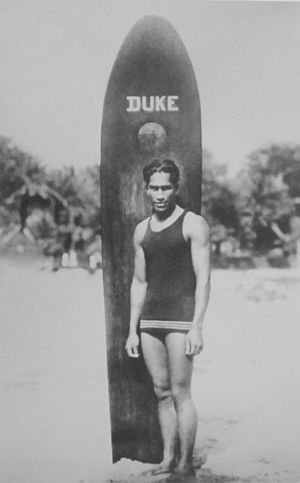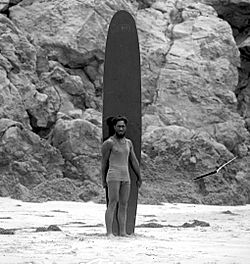Duke Kahanamoku facts for kids

Duke Kahanamoku c. 1912
|
|||||||||||||||||||||||
| Personal information | |||||||||||||||||||||||
|---|---|---|---|---|---|---|---|---|---|---|---|---|---|---|---|---|---|---|---|---|---|---|---|
| Born | August 24, 1890 Haleʻākala, Honolulu, Kingdom of Hawaii |
||||||||||||||||||||||
| Died | January 22, 1968 (aged 77) Honolulu, Hawaii |
||||||||||||||||||||||
| Height | 6 ft 1 in (185 cm) | ||||||||||||||||||||||
| Weight | 190 lb (86 kg) | ||||||||||||||||||||||
| Sport | |||||||||||||||||||||||
| Sport | Swimming | ||||||||||||||||||||||
| Strokes | Freestyle | ||||||||||||||||||||||
| Club | Waikiki Beach Boys | ||||||||||||||||||||||
|
Medal record
|
|||||||||||||||||||||||
Duke Paoa Kahinu Mokoe Hulikohola Kahanamoku (born August 24, 1890 – died January 22, 1968) was a famous Hawaiian swimmer and the person who helped make the sport of surfing popular around the world. He was a Native Hawaiian, born into a respected family in the Kingdom of Hawaii. Duke lived to see Hawaii become a U.S. state. He won five Olympic medals in swimming, showing off his amazing skills in 1912, 1920, and 1924.
Beyond sports, Duke Kahanamoku was also a law enforcement officer, an actor, and a businessman. He was a true Hawaiian hero who shared the spirit of aloha with everyone he met.
Contents
Duke Kahanamoku's Early Life
Duke Kahanamoku was born in Honolulu, Hawaii. His full name, "Duke," was not a title or a nickname, but his actual first name. He was named after his father, Duke Halapu Kahanamoku, who was named in honor of a visiting prince.
Duke's family was from important Hawaiian ohana (families). They were respected and served the Hawaiian royalty. Duke had five brothers and three sisters. All his brothers were also good at water sports.
In 1893, his family moved to Waikiki, close to his mother's family. Duke grew up with his siblings and many cousins. He spent most of his youth at the beach, where he became very skilled at surfing and swimming.
Developing His Skills
When he was young, Duke used a traditional surfboard called a "papa nui". It was made from koa wood, was about 16 feet (4.9 meters) long, and weighed about 114 pounds (52 kg). This board did not have a fin (called a skeg), which had not been invented yet.
Duke was also a very strong swimmer. On August 11, 1911, he swam 100 yards (91 meters) freestyle in 55.4 seconds in Honolulu Harbor. This was much faster than the world record at the time. He also broke or matched other records. However, the Amateur Athletic Union (AAU) at first did not believe his times. They thought the judges used alarm clocks instead of stopwatches or that ocean currents helped him. They recognized his achievements much later.
Duke's Olympic Swimming Career
Duke Kahanamoku easily made the U.S. Olympic swimming team in 1912. At the 1912 Summer Olympics in Stockholm, Sweden, he won a gold medal in the 100-meter freestyle. He also won a silver medal with the U.S. team in the 4×200-meter freestyle relay.
At the 1920 Summer Olympics in Antwerp, Belgium, Duke won two more gold medals: one in the 100-meter freestyle and another in the 4×200-meter freestyle relay.
In the 1924 Summer Olympics in Paris, France, Duke won a silver medal in the 100-meter freestyle. His younger brother, Samuel, won the bronze medal in the same race! Even though he was 34 years old, Duke still showed his amazing talent. He later served as an alternate for the U.S. water polo team at the 1932 Summer Olympics.
Spreading the Joy of Surfing
After his Olympic swimming career, Duke Kahanamoku traveled around the world. He gave swimming demonstrations and, more importantly, showed people the sport of surfing. Before Duke, surfing was mostly known only in Hawaii. He helped introduce it to mainland America in 1912 in California.
One very important surfing demonstration happened in Sydney, Australia, on December 24, 1914. This event is seen as a key moment in making surfing popular in Australia. The surfboard Duke used there, which he made from a piece of local pine wood, is still kept by the Freshwater Surf Life Saving Club. A statue of Duke Kahanamoku stands in his honor at Freshwater Lake in Australia.
A Hero and Public Servant
While living in Southern California, Duke also worked as an actor in Hollywood films. He used these connections to help spread the word about surfing even more. He also worked as a lifeguard and competed in swimming and water polo for the Los Angeles Athletic Club.
In 1925, while in Newport Beach, California, Duke became a real-life hero. He rescued eight men from a fishing boat that had flipped over in rough waves. Using his surfboard, Duke made many trips from the shore to the capsized boat, helping to save several people. Other surfers also helped. The police chief at the time called Duke's actions "The most superhuman surfboard rescue act the world has ever seen." This event led to lifeguards across the U.S. starting to use surfboards as standard equipment for water rescues.
Duke Kahanamoku was the first person to be honored in both the Swimming Hall of Fame and the Surfing Hall of Fame. The Duke Kahanamoku Invitational Surfing Championships in Hawaii, a major professional surfing contest, was named after him. He is also a member of the U.S. Olympic Hall of Fame.
Later in his life, Duke was elected as the Sheriff of Honolulu, Hawaii. He served for 13 terms, from 1932 to 1961! During World War II, he also worked as a military police officer. He also appeared in some television shows and films, like Mister Roberts (1955).
Personal Life
On August 2, 1940, Duke Kahanamoku married Nadine Alexander, a dance instructor from Ohio. Duke was 50 years old, and Nadine was 35.
Duke's Legacy
Duke Kahanamoku passed away from a heart attack on January 22, 1968, at the age of 77. For his burial at sea, a long line of people and a police escort traveled to Waikiki Beach. His ashes were scattered into the ocean, while a group of beach boys sang Hawaiian songs, including "Aloha Oe".
Statues and Tributes
Many statues and places honor Duke Kahanamoku:
- In 1994, a statue of Duke was put up in Freshwater, Australia. It's a main feature of the Australian Surfers Walk of Fame.
- In 2015, a monument with a copy of Duke's surfboard was unveiled at New Brighton beach in New Zealand. This was to celebrate 100 years since Duke visited there.
- A statue of Duke Kahanamoku is also in Huntington Beach, California. A restaurant nearby is named after him.
- In 2022, a special "Blue Plaque" was announced in New South Wales, Australia, to recognize Duke's important role in surfing.
Many other things are named after Duke:
- A famous showroom in Waikiki was called "Duke Kahanamoku's" in the 1960s.
- The Duke Kahanamoku Aquatic Complex (DKAC) is a swimming and diving facility at the University of Hawaii.
- There is a chain of beachfront restaurants called Duke's in Hawaii, California, and Florida.
- On August 24, 2002, the U.S. Postal Service released a special stamp with Duke's picture on it.
- On August 24, 2015, Google Doodle honored Duke Kahanamoku's 125th birthday.
Filmography
| Year | Title | Role | Notes | |
|---|---|---|---|---|
| 1925 | Adventure | Noah Noa | ||
| The Pony Express | Indian Chief | Uncredited | ||
| No Father to Guide Him | The Lifeguard | Short | ||
| Lord Jim | Tamb Itam | |||
| 1926 | Old Ironsides | Pirate Captain | Uncredited | |
| 1927 | Hula | Hawaiian Boy | Uncredited | |
| Isle of Sunken Gold | Lono | |||
| 1928 | Woman Wise | Guard | ||
| 1929 | The Rescue | Jaffir | ||
| Where East Is East | Wild Animal Trapper | Uncredited | ||
| 1930 | Girl of the Port | Kalita | ||
| Isle of Escape | Manua | |||
| 1931 | Around the World with Douglas Fairbanks | Himself | Documentary | |
| The Black Camel | bit part as surf instructor | at 0:01:36 | ||
| 1948 | Wake of the Red Witch | Ua Nuke | ||
| 1955 | Mister Roberts | Native Chief | (as Duke Kahanamoko) | |
| 1959 | This Is Your Life | Himself | Episode: "Duke Kahanamoku" | |
| 1967 | Free and Easy | Himself | Documentary | |
| Surfari | Himself | Documentary | ||
| Source: | ||||
See also
 In Spanish: Duke Kahanamoku para niños
In Spanish: Duke Kahanamoku para niños
- Google Arts & Culture - "Duke Paoa Kahanamoku"
- Google Maps - Public Art "Duke Kahanamoku"
 | Kyle Baker |
 | Joseph Yoakum |
 | Laura Wheeler Waring |
 | Henry Ossawa Tanner |


